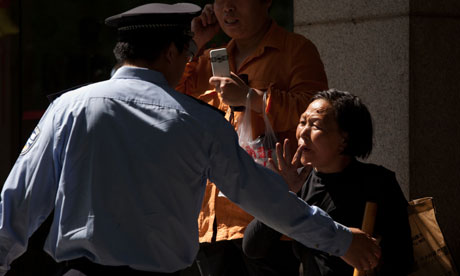Dissidents fear Chinese authorities will launch crackdown to prevent them following example of man who fled to US embassy


A Chinese petitioner is approached by police outside the hopital where Chen Guangcheng is being treated in Beijing. Photograph: Ed Jones/AFP/Getty Images
Chinese human rights campaigners have warned of a crackdown on the dissident community despite expectations that Beijing will clear the way for the activist Chen Guangcheng to travel abroad to study.
Dissidents believe the government is likely to tighten the screws on prominent critics to prevent them from following Chen's lead to challenge their authority.
"I think that after the Chen Guangcheng incident, the situation for us will just become worse and worse, because in today's society government power has no limits," said Liu Yi, an artist and supporter of Chen.
The US expects China to quickly clear the way for Chen to travel to America after days of fraught negotiation. China's foreign ministry hinted at a possible face-saving deal in an ambiguous statement saying the blind activist could apply to study abroad like other citizens.
The US state department spokeswoman Victoria Nuland said: "Mr Chen has been offered a fellowship from an American university, where he can be accompanied by his wife and two children.
"The Chinese government has indicated that it will accept Mr Chen's applications for appropriate travel documents. The United Statesgovernment expects that the Chinese government will expeditiously process his applications for these documents, and make accommodations for his current medical condition. The United States government would then give visa requests for him and his immediate family priority attention."
Liu Feiyue, an activist who runs a rights monitoring network in the central province of Hubei, warned that other dissidents should not expect similar concessions from the government.
"This is only an individual case. Because it turned into a China-US incident, the US put a lot of pressure on China, which is why the authorities made a concession to allow Chen Guangcheng to study overseas," he said. "Not all dissident cases can become international issues."
Chen had agreed to remain in China to study with government assurances on his safety, but changed his mind after leaving the US embassy in Beijing, where he had fled after escaping from 19 months of house arrest in eastern Shandong province.
Chen, a self-taught legal activist, was originally praised by authorities for helping disabled people defend their rights, but angered officials by defending women who had undergone forced abortions and sterilisations, which are illegal in China.
US embassy officials and doctors met Chen on Friday and said he had suffered three broken bones and his foot was in a cast after his escape.

No comments:
Post a Comment